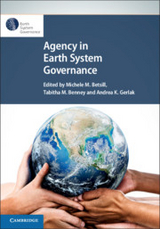
Conclusion:policy implications of ESG–agency research and reflections on the road ahead
Gerlak, Andrea K. / Michele M. Betsill / James J. Patterson / Sander Chan / Tabitha M. Benney / Marie-Claire Brisbois / Thomas R. Eimer / Michelle ScobieExterne Publikationen (2020)
in: Michele M. Betsill / Tabitha M. Benney / Andrea K. Gerlak (eds.), Agency in earth system governance, Cambridge: Cambridge Univ. Pr., 183-197
ISBN: 978-1-10868-827-7
DOI: https://doi.org/10.1017/9781108688277.015
Information
The role of the state as an agent of earth system governance has become more complex, contingent, and interdependent. − Although participatory and collaborative processes have contributed to more effective, equitable, and legitimate environmental governance outcomes in some instances, analyses of these processes should be situated within a broader governance perspective, which recasts questions of policy change around questions of power and justice. −The complexity and normative aspects of agency in earth system governance requires new forms of policy evaluation that account for social impacts and the ability of governance systems to adapt. − Many of the core analytical concepts in ESG–Agency scholarship, such as agency, power, authority, and accountability, remain under-theorized. In addition, some types of actors, including women, labor, non-human agents, those who work against earth system governance, and many voices from the Global South, remain largely hidden. − ESG–Agency scholars need to develop research projects and collaborations in understudied regions while also recruiting and supporting scholars in those regions to engage with this research agenda.

